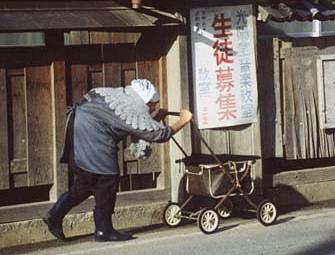|
|
Japan Lawmakers Disclose Pension Payments
By Audrey McAvoy, The China Post
April 29, 2004

Amid a raucous debate in Parliament on how to save Japan's national pension system, ruling and opposition lawmakers said on Wednesday they would disclose how faithful they've been in paying their premiums.
The announcement came after three Cabinet members were found last week to have failed to pay their premiums for years. One was Trade Minister Shoichi Nakagawa who hadn't paid for over two decades.
All three said they weren't aware of their infractions, and promised to immediately pay what they owed.
Rising numbers of Japanese have been skipping out of the system because they think it's too expensive or are concerned they might not be able to collect when they retire.
The government, meanwhile, is trying to ease fears about the pension system's solvency with a bill it wants Parliament to pass early next month. It's also trying to close loopholes to raise the participation rate.
Shinzo Abe, the secretary-general of the ruling Liberal Democratic Party, said the Cabinet ministers' failure to pay was a separate matter from the pension legislation. The ministers' carelessness should not prevent passage of the bill, he said.
"The pension bill is about balancing payouts and payments for the future," Abe told a news conference. "We don't have much time, in terms of the finances of the pension system, to wait to adopt it."
Most corporate employees are automatically enrolled in the national pension system. The self employed, including farmers, register separately.
Participation in the program is mandatory for adults living in Japan, but not paying isn't a criminal offense.
By 2002, the ratio of self-employed individuals of eligible age who'd failed to pay into the system rose to 37 percent, from 16 percent in 1995.
The bill written by the LDP and its coalition partner, the New Komeito, would gradually lift pension premiums over the next 14 years. It would also cut back pension pay-outs, but set a minimum limit.
Opposition parties say the bill increases the burden on citizens and avoids the needed radical reforms.
By 2050, 35.7 percent of the population is expected to be over 65 years old up from 20 percent in 2005.
A lower house committee passed the bill on Wednesday, clearing the way for the full chamber to pass it early next month.
Depending on what the planned disclosure by the Cabinet and their opposition Democratic Party counterparts reveals, however, it could overshadow the vote. Japanese media speculated that the announcements would show more politicians had neglected to pay into the system.
|
|



